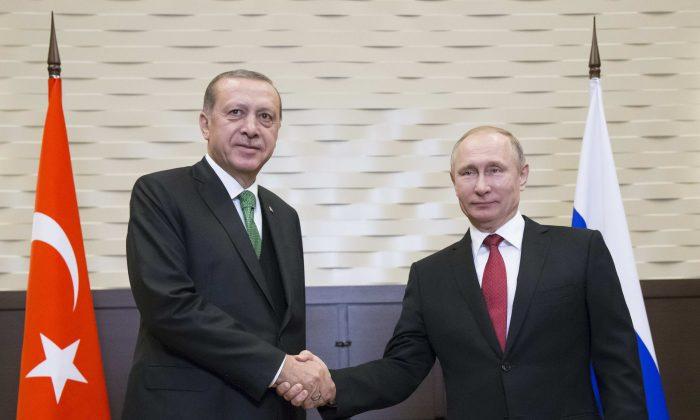The old energy order is changing rapidly, and with it, new challenges are emerging. Improved extraction technologies and new oil field discoveries continue to expand crude oil and natural gas production possibilities around the world.
This fundamental supply shift in the world’s most critical resource represents enormous opportunities for some nations, while posing threats to others.
A Westward Shift
The changes in the global energy sector are interesting for everyone, whether they bear good news or bad. After many decades of the Organization of the Petroleum Exporting Countries (OPEC) controlling the world’s energy prices and supplies—specifically crude oil and natural gas—new and plentiful sources have been found and are being developed in the West.There will be big advantages for some, and serious economic and even geopolitical consequences for others.
The two biggest positive changes in energy suppliers involve the United States and Israel. In America, enhanced fracking technology has opened up vast new supplies of oil and natural gas. As a result, the United States is today the world’s biggest producer of oil, surpassing both Saudi Arabia and Russia in crude oil production. It is also highly competitive in the production and export of natural gas. That, in itself, is a supply shock to the energy markets.
Likewise, Israel is strategizing how to leverage its recent discovery of vast oil and natural gas beneath the eastern Mediterranean. Both of these supply shocks will affect oil
production and price, but in particular, they could have the most negative impacts on Saudi Arabia, Russia, and Iran. Even Venezuela’s production fall and Iran’s limited exports aren’t enough to keep prices high.
Moving Pieces
It’s not front-page news, but trade is the lifeblood of nations. Saudi Arabia and Russia are the first- and second-largest oil exporters in the world—both are heavily dependent upon energy exports to keep their economies afloat.
This is where things get complicated for our allies and adversaries alike. Oil and gas exports comprise 50 percent of the Saudi Arabian GDP and about 70 percent of export earnings, while they make up about
60 percent of Russia’s economy. The new reality of high American output lowers U.S. demand for Saudi crude oil imports, and potentially that of other nations as well.
Saudi Arabia is already feeling the pressure of resistance within its repressive Islamic dictatorship and the pressure of international condemnation for the murder of a journalist critical of the Saudi regime. It’s also under pressure from within to modernize its society and diversify its economy. The last thing that Saudi Arabia needs is economic duress due to loss of market share. Tough reforms are always better implemented during good times, although that rarely happens.
As the leader of OPEC and the Arab nations, as well as an American ally, Saudi Arabia faces deep conflicting interests challenging its leadership—and its relationship with the United States—as never before. And Iran’s drive for nuclear weapons and expanding its version of radical Islam at the expense of Saudi Arabia is a paramount concern and explains why the Saudis seek nuclear
technology for energy and potentially for weaponry.
Israel’s Newfound Reserves
Similarly, Israel’s newfound oil and natural gas reserves will offer Europe an alternative to relying on Russian natural gas and oil. This is good for Europe because, for years, it has been vulnerable to Russian goodwill for much-needed natural gas,
40 percent of which is supplied by Russia’s state-owned oil company, Gazprom. As Europe has experienced in the past, Russian
goodwill hasn’t always been forthcoming.But the Israel energy situation also puts Russia, which is basically a nuclear-armed gas station, in a very precarious position. Barring oil, natural gas, arms, and vodka, Russia doesn’t produce anything that the world wants to buy. With a potential rival supplying natural gas to Europe and potentially Asia, it’s very possible that Israel’s gain will be largely at
Russia’s expense. That will put Russia in a serious bind, although the development of critical infrastructure is still years off, especially because of Turkish opposition.
As the Russian economy faces further economic slowdown at home, it becomes more difficult for Russian President Vladimir Putin to finance his plans for further expansion. Those plans include establishing a
permanent presence in Syria and other parts of the Middle East, potentially annexing more or all of
Ukraine, and perhaps even further westward to the
Baltics. All these big projects take rubles, but paradoxically, the lack thereof may also precipitate these events. In either case, Israel represents a strategic threat to Russian interests.
Iran’s oil-dependent economy is also threatened by the expansion of oil and natural gas supplies in the West. As the world’s fifth-largest oil producer and an avowed enemy of Israel and the United States, Iran is doubly sensitive to market loss because of the resumption of U.S. trade sanctions by the Trump administration against it.
Still, Iran continues to wage a proxy war against Israel, even with domestic resistance against Islamic theocratic rule on the rise. The specter of cheaper, more abundant oil on the world market supplied by its enemies makes Iran’s already poor future economic prospects even less promising. With oil prices remaining low and Israel threatening to block illegal Iranian oil
shipments, the Iranian regime’s growing alliance with Russia increasingly appears as two drowning men looking to the other for assistance.
Thus, Russian and Iranian challenges in the face of Israeli oil and gas exportations are rather apparent. But Turkey is also a key player in the unfolding Israeli energy play. In broad strokes, Turkey is challenging Israel’s claims to the oil. The fields extend from the shores of Israel to at least the island of Cyprus, which Turkey has claimed, amid conflicting international opinion, since the 1970s. Turkey is also challenging the plans for pipeline routes to Europe.
The kicker is that Turkey, a former ally of Israel, has turned toward Islamic expansion during the past decade. Turkey’s President Recep Tayyip Erdogan dreams of re-establishing the Ottoman Turk
caliphate that ruled much of Asia and the Middle East for centuries. The oil in the Mediterranean would certainly help fund that cause, or at least give a much-needed boost to Turkey’s failing
economy.
Perhaps not so coincidentally, Russia, Iran, and Turkey are coordinating their
efforts to manage the Syrian crisis, which puts all three of their military forces very close to Israel’s northern border. The positioning couldn’t be clearer. It certainly makes Israel’s entry into the energy markets more than a little problematic.
James Gorrie is a writer based in Texas. He is the author of “The China Crisis.”
Views expressed in this article are opinions of the author and do not necessarily reflect the views of The Epoch Times.






Friends Read Free